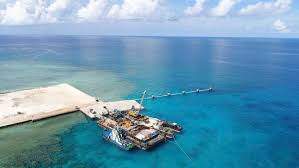US: China’s Claims in South China Sea ‘Completely Unlawful’

The United States said Monday China’s claims to offshore resources across most of the South China Sea are “completely unlawful,” as is Beijing’s campaign of bullying to control them.
Some experts told VOA this is the first time that Washington “explicitly” endorsed the substance of a binding ruling by a Permanent Court of Arbitration in The Hague four years ago.
“The PRC has no legal grounds to unilaterally impose its will on the region,” U.S. Secretary of State Mike Pompeo said in a statement Monday, referring to the People’s Republic of China (PRC.)
Beijing has offered no coherent legal basis for its “nine-dash line” claim in the South China Sea since formally announcing it in 2009, Pompeo said.
China vies with Brunei, Malaysia, Taiwan, Vietnam, and the Philippines over parts of the 3.5 million-square-kilometer South China Sea north of the Natuna Islands.
China uses a “nine-dash line,” sourcing it to maritime records from dynastic times, to claim about 90% of the waterway that others in the region value for its fisheries and undersea fossil fuel reserves. The nine dashes also cut into some nations’ Exclusive Economic Zone (EEZ).
The Hague-based Permanent Court of Arbitration, in a binding decision issued July 12, 2016, rejected China’s maritime claims as having no basis in international law. China dismissed the ruling.
While the U.S. has always supported international law in the South China Sea and backed the 2016 decision by The Hague as “final and legally binding,” experts said the State Department’s Monday statement goes a step further by specifically listing unlawful Chinese actions according to the 2016 ruling.
It stated China can neither lawfully assert a maritime claim, including any EEZ claims, derived from Scarborough Reef and the Spratly Islands, nor have valid maritime claims to the fisheries and potentially energy-rich Mischief Reef or Second Thomas Shoal. The statement also said the U.S. is aligning its position with the Tribunal’s decision.
“It clears the way for much more forceful criticism of Chinese harassment in the waters identified, which happen to be those that saw crises over the last year or so. And it puts pressure on international partners like the Europeans to get off the fence and take a stand,” Greg Poling, director of the Asia Maritime Transparency Initiative at the Center for Strategic and International Studies, told VOA Monday.
The U.S. rejects any Chinese maritime claim in the waters surrounding Vanguard Bank (off Vietnam), Luconia Shoals (off Malaysia), waters in Brunei’s EEZ, and Natuna Besar (off Indonesia), the State Department statement said.
It added China has no lawful territorial or maritime claim to (or derived from) James Shoal, an entirely submerged feature only 50 nautical miles from Malaysia.
Poling said the U.S. is “siding with the Southeast Asian claimants and the international community as a whole when it comes to maritime rights. But it very carefully maintains American neutrality on sovereignty. It says China can claim the islands, but it can’t invent its own law of the sea around them.”
Although the United States is not a claimant to the sovereignty over disputed islands in the South China Sea, Washington said it is vital to its national interests that various claimants pursue their claims peacefully, and in accordance with international law.
Other analysts said Washington’s redoubling efforts to ensure the freedom of the seas is unlikely to reverse Beijing’s course in the contested region.
“While the new U.S. statement is intended to signal a harder line, whether and how the U.S. intends to enforce this new alignment of U.S. policy with the 2016 arbitral tribunal ruling will be more important, as it is unlikely signaling alone will change China’s behavior,” U.S. Institute of Peace senior policy analyst Patricia Kim told VOA.
After a show of military might, Beijing said July 1, after consultation with Southeast Asian leaders, that it would resume negotiations on a code, pending since 2002, that would help ships avoid mishaps and resolve any accidents in the vast yet crowded South China Sea.
Beijing's move comes after it flew military planes at least eight times over a corner of the sea near Taiwan and sent survey ships to tracts of the waterway claimed by Malaysia and Vietnam.




